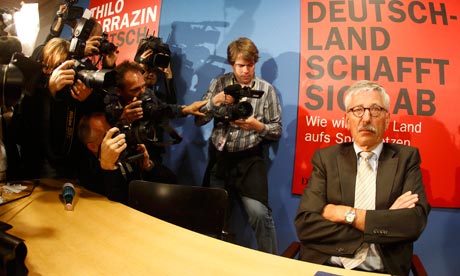
The German chancellor, Angela Merkel, has called for the dismissal from the central bank of a prominent board member who has repeatedly said that Muslim immigrants in Germany are unfit and unwilling to integrate into society.
The Bundesbank said that comments made by Thilo Sarrazin in a highly publicised new book were harmful to the bank and violated its code of conduct. It said it would meet with the banker before deciding about his future.
Sarrazin has unleashed an impassioned debate about Germany's immigrant population by saying that the behaviour of its members is putting the country under threat.
His thesis, set out in a book published today , has stoked the wrath of politicians, and Muslim and Jewish groups, and led to calls for his dismissal from his €230,000 a year (£188,000) Bundesbank post and from the Social Democratic party (SPD).
Merkel's spokesman, Steffen Seibert, said that Sarrazin's remarks had "clearly damaged the national and international standing of the bank" and managers should consider his future.
But Sarrazin has received the backing of others who say the former politician is merely outlining issues and concerns about integration that have remained taboo for too long.
In Deutschland Schafft Sich Ab, or Germany is Digging its Own Grave, Sarrazin argues that most of the country's immigrants cannot be integrated into society and contribute nothing to it.
He also blames foreigners – mainly Germany's Muslim population – for "dumbing down" society. He says that the rate at which Muslim women are reproducing means that Germans may soon become "strangers in their own country".
The book is already a bestseller and has prompted comparisons to Geert Wilders, the head of the Dutch far-right Freedom party.
The former Berlin finance senator said he wrote the book to outline his own fears that his grandchildren will grow up in a country where "their lives are measured out by the muezzin's calls to prayer".
At the book's Berlin launchtoday he rejected accusations that he was encouraging xenophobia and racism.
"I invite everyone to find discrepancies in my theories," he said. "It's an uncomfortable discussion, but to solve problems we have to first recognise them."
Outside the press conference a group of demonstrators protested against the book under the banner "Stop rightwing populism". Merkel made a rare intervention in the row, delivering a stern criticism of the book.
In an interview on the state broadcaster ARD, she called Sarrazin's statements "totally unacceptable" and "discriminatory – they show contempt towards entire groups in society". She added that Sarrazin was hindering integration efforts and "complicating the way in which these issues are discussed … the style and manner in which this is being discussed here is divisive for society."
Merkel hinted at her impatience with the Bundesbank's slowness in making a statement on the issue, saying that as the country's "calling card", the bank had to react.
There was pressure today on the Bundesbank to dismiss Sarrazin. Its president, Axel Weber, was due to make a statement following his return from the meeting of the world's central bank chiefs at Jackson Hole in Wyoming.
The leadership of the SPD was preparing to review Sarrazin's membershiptoday after the party leader, Sigmar Gabriel, said: "I don't know where he belongs in our party any more."
But Sarrazin said he would refuse to hand over his party membership book, which he insisted he would "take with me to the grave". He added: "I am the member of a people's party and will remain a member of this party, because I believe that this is precisely where these themes belong."
Meanwhile, the general secretary of the Central Council of Jews told the author that he would be better suited to the far-right National Democratic party following Sarrazin's statement that "all Jews shared the same gene", like Basques.
Among those who defended Sarrazin was Peter Gauweiler, of the Christian Social Union. He said it was good for Germany to be having the debate, adding that Sarrazin's critics were in danger of "appearing to want to stifle the ability of someone who thinks differently from them from speaking the truth". The Turkish-German writer and sociologist Necla Kelek, who was at Sarrazin's side when he presented his book to the public, said the banker was doing Germany a service and that he shared his concerns about the country's future. "(He) is calling on us Muslims to reflect on the role we play in Germany," Kelek said. "To accuse him of racism is absurd, because Islam is not a race, but a culture and a religion.
From the book
"Muslim immigration is connected more strongly than any other with welfare state dependency and criminality."
"With no other religion is there such a fluid connection between violence, dictatorship and terrorism as there is with Islam."
"Boys are taught an exaggerated idea of the readiness to be violent … for the sake of 'honour'. Young men take this role all the more seriously the less successful they are in the school system – where their performance is still much worse than that of Muslim girls."
"In Berlin 20% of all acts of violence are carried out by only 1,000 Turkish and Arabic youths, a population group that makes up just 0.3% of the entire Berlin population."
"A measure of a willingness to integrate is the attitude towards marriage, which steers the speed at which a society comes together … In this regard things are looking bad, because only 3% of young men and 8% of young women with a Turkish migrant background marry Germans partner. Among Russians of German descent the figure, by contrast, is 67%."
"The proportion of congenital disabilities is way above average among Turkish and Kurdish migrants. However, the topic is hushed up." It doesn't take much to think that hereditary factors might be responsible for the failure of some of the Turkish population in the German school system."

